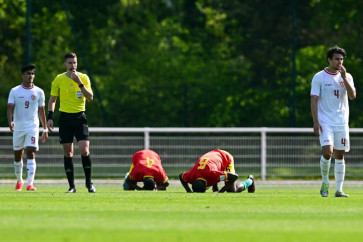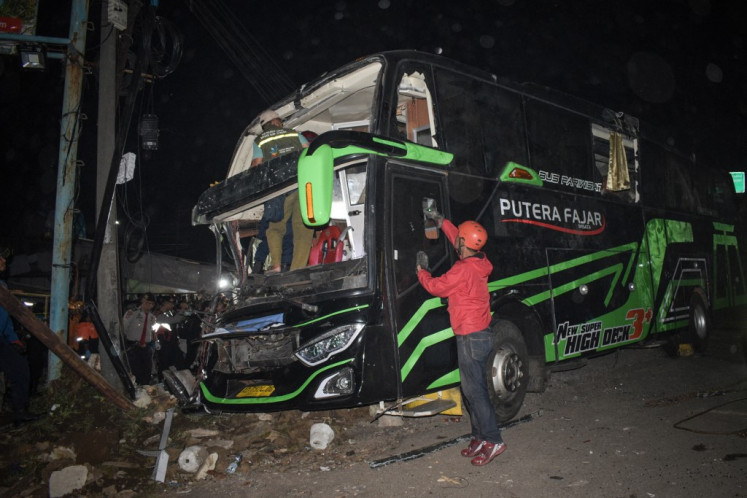Half-hearted water deprivatization
Newfound fun: After previously relying only on groundwater, residents of Tanah Merah, North Jakarta, gained access to piped water provided under the Indonesia Urban Water Sanitation and Hygiene (IUWASH), an Indonesia-US cooperation program, in 2016
Change Size

N
span class="inline inline-center">Newfound fun: After previously relying only on groundwater, residents of Tanah Merah, North Jakarta, gained access to piped water provided under the Indonesia Urban Water Sanitation and Hygiene (IUWASH), an Indonesia-US cooperation program, in 2016.(JP/PJ Leo)
A Supreme Court ruling asserting that it is unconstitutional to entrust the management of water distribution to a private entity has prompted the Jakarta city administration to promise to go back to public water management. Given the daunting task, the remunicipalization effort is only the beginning of fresh red tape, before customers may eventually obtain decent services, The Jakarta Post’s Safrin La Batu reports.
About 600 poor families in Kapuk Muara, a fishing village in the Jakarta Bay area that had relied on fetid urban wells for water all their lives, celebrated the rumbling sound of tap water filling up their bathtubs last December.
The luxury of running water supplied by the city administration came 10 years after they had signed up for a connection — as ironic as that may sound, particularly because it happened in the capital of the republic.
Similar problems affect other quarters of the city of 10 million people, who bear the brunt of seasonal flooding. Half of the city’s households still have no access to tap water. Poor infrastructure is the usual scapegoat.
Since 1997, the supply of drinking water in the city has been entrusted to two private operators — PT PAM Lyonnaise Jaya (Palyja) and PT Aetra Air Jakarta (Aetra).
Jakarta-owned water operator PT PAM Jaya claims that clean water supply now covers 60 percent of the capital, but the Amrta Institute for Water Literacy, an independent research organization, has a far smaller figure: 35 percent.
Coverage has not improved much since the private firms began their operations. PAM Jaya president director Erlan Hidayat said most of the families that lack piped water access are those in West Jakarta and North Jakarta. They belong mostly to the low and lower-middle income brackets.
“We have to admit that the water coverage in Jakarta today is only 60 percent, meaning that much of the city has yet to get access to clean water,” Erlan said.
Vague ruling
Palyja, whose majority of shares is owned by France-based Suez Environment, manages the water distribution in West, South and parts of Central Jakarta, while Aetra, owned by Singapore-based Acuatico, handles East, North and parts of Central Jakarta.
Civil groups have for decades demanded improvement and asked that the water management be returned to PAM Jaya as a public company that now acts only as a supervisor. All technical work on the ground is done by the two operators.
The groups clinched a significant win last year when the Supreme Court ruled in their favor. The highest court also ordered the city administration to stop water privatization.
The Jakarta administration has to comply with the ruling. Unfortunately, administrative and legal hurdles are getting in the way of Jakarta’s effort to take over the water management.
The ruling cannot be easily executed, because it is just too ambiguous. The Supreme Court did not explicitly revoke the 1997 contract that granted the two companies the rights to manage water in the city until 2023. That leaves room for debates on whether or not unilaterally terminating the contract would violate the law. NGOs, however, insist that the court’s order to stop privatization means the contract is void.
The city administration, for its part, adheres to the notion that, since the court did not explicitly terminate the contract, the agreement is still valid. It will, therefore, wait until 2023 before completely taking over the management of water from the private operators.
So, it is doing “internal restructuring” of the existing contract, aiming to gradually expand the role of PAM Jaya in the clean water management while trying to comply with the court ruling.
Under the restructured contract, PAM Jaya would take over certain tasks, including raw water provision and customer services, such as pipeline installations, monitoring and customer billing. All these new authorities are expected to pave the way for the public company to solve problems like low distribution coverage, pipe leakage and poor water quality.
The private operators, meanwhile, would continue to handle water filtration. Now, Palyja and Aetra do all the jobs, including raw water supply, water purification and piping installations.
“Raw water [provision] can no longer be handled by a [private] partner, and neither can customer services, therefore, we will have access to revenue collection […] and will just pay the partners [for their services],” Erlan said.
How effective the restructuring would be in solving the problems, meanwhile, is open for debate. Many believe PAM Jaya should serve as the sole operator.
“A technical solution without political change won’t make much of a difference,” Muhammad Reza, the coordinator of the People’s Coalition for the Right to Water (Kruha), told The Jakarta Post.
“The management should be returned to the public under the governor’s power,” he added.

Money-losing enterprise
The private operators’ poor performance is well known. For ordinary customers, this reflects in inexplicable supply disruptions. Statistical data provide tell-tale signs of the poor service.
In 2013, the service coverage was 59 percent, below that year’s target of 66 percent, according to PAM Jaya’s report. Leakage stayed at 44 percent, way above the targeted 38 percent.
Jakarta’s tap water is the priciest among big cities in the country, according to Nila Ardhanie, the director of Amrta Institute. Her recent study found that a cubic meter of water in Jakarta cost Rp 7,020 (50 US cents) in 2012, far more than the Rp 2,600 in Surabaya and Rp 2,294 in Medan.
“Jakarta customers have to pay a lot more, while they receive poor services,” Nila said.
Besides, PAM Jaya still has to pay the private operators for water filtration, which is the costliest step in the water supply chain.
Palyja’s corporate communication director, Linda Nurhandayani, did not respond to the Post’s request for comment.
The Jakarta Supreme Audit Agency (BPK) has revealed that PAM Jaya had suffered Rp 1.4 trillion in financial losses between 1998 and 2015, but Erlan was quick to dismiss the finding, saying it was not the result of the agreement between PAM Jaya and the operators.
According to the Amrta Institute, what the agency counted as a loss was, in fact, the difference between the lower income from water billing and the bigger amounts that PAM Jaya paid to the operators.
Within PAM Jaya, estimated losses resulting from the partnership have become a long-standing dispute. Maurits Napitupulu, a former PAM Jaya president director, once famously said that the public company could suffer up to Rp 18.2 trillion in losses by the end of the contract in 2023. A strong advocate of water remunicipalization, Maurits was fired shortly after making the statement.
PAM Jaya applies two rates in its business. The first is known as the “water charge”, which is what PAM Jaya pays the operators. The second is the water tariffs customers pay PAM Jaya. Critics say that policy only benefits the private operators, while leading to losses for the public enterprise.
The water charge is subject to renegotiation every five years, known as “rebasing”. The water charge is fixed, meaning PAM Jaya pays the operators for every cubic meter processed, regardless of whom the water is sold to. Meanwhile, the water tariff is flexible, depending on the category of customers, but it ranges from Rp 1,050 to Rp 14,650.
While the water charge can be renegotiated, PAM Jaya normally does not have the flexibility to increase the water tariffs, given the weak economic situation of some of its customers.
In 2012, Indonesia Corruption Watch (ICW) reported PAM Jaya to the Corruption Eradication Commission (KPK), alleging that the rebasing system had caused the public enterprise to lose
Rp 561 billion to the private operators. Tempo Magazine, which investigated the case in 2014, found a link between the alleged corruption and the 2012 Jakarta gubernatorial election, in which incumbent Fauzi Bowo sought reelection (but he lost to Joko “Jokowi” Widodo, now the president).
“PAM Jaya should suspend the contract, then conduct an audit,” Muhammad Reza of Kruha said.
Inspired by Paris
After some soul searching, the new city administration is looking to Paris for its water management model. In Paris, the drinking water system used to be managed by private operators until 2009, when it was decided to remunicipalize the service to better serve residents.
Last month, deputy governor Sandiaga Uno entertained Anne Le Strat, the deputy mayor of Paris in charge of water supply and sanitation from 2008 to 2014. In an interview with The Post, Le Strat said the best solution to problems in the supply of clean water in Jakarta would be to have a single operator, as Paris has.
“I think it is better to have a sole operator, not like it was in Paris and in Jakarta. When there is a division [in operational areas], the city is divided, in this case, you can lose information, economic and technical matters,” she said.
“So, one operator is best, and, of course, it should be public. All the water revenue can be reinvested […], because there is no dividend [to be paid to company shareholders], so it’s better.”
The remunicipalization of Paris’ water distribution is a success story that many big cities in the world wish to replicate. Le Strat claimed that service coverage had already reached 100 percent in her city, even when the water management was still overseen by private operators.
“There’s also a big difference. All Parisians already had access to water, even when it was managed by private companies. This is a big difference [between Paris and Jakarta],” Le Strat said.
As Sandiaga asserts, learning from Paris’ experience may lead to a better solution to Jakarta’s water problem. But Jakarta’s business restructuring option, instead of immediate change, will probably mean that remunicipalization of Jakarta’s water supply will be a long and arduous bureaucratic process.
In the meantime, more than five million Jakartans thirsty for better clean water services are kept waiting.









